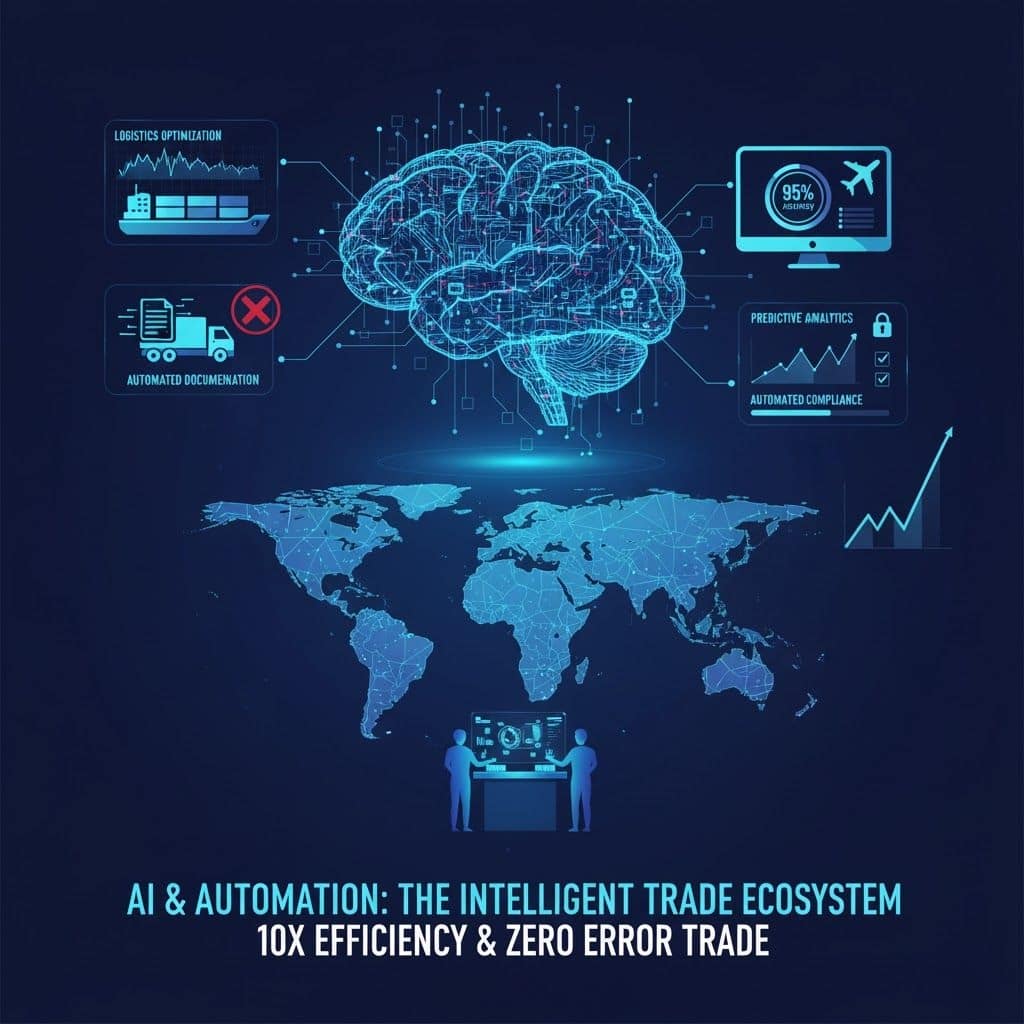Blog
AI, Automation, and the Intelligent Trade Ecosystem: Beyond Efficiency to Transformation

The integration of Artificial Intelligence (AI) and advanced automation is no longer a futuristic concept but a present-day imperative transforming every facet of global trade. From hyper-optimized logistics to predictive market analysis and automated compliance, AI is moving trade beyond mere efficiency gains into a realm of unprecedented speed, accuracy, and strategic foresight. This isn’t just about doing things faster; it’s about fundamentally rethinking how trade operations are managed, from end to end.
Key Takeaways for B2B Stakeholders
- Autonomous Supply Chain Management: AI-powered systems are taking over routine decision-making, from inventory reordering to optimal route planning, creating self-correcting and adaptive supply chains.
- Hyper-Personalized Marketplaces: AI will analyze buyer behavior, preferences, and historical data to offer highly personalized product recommendations, dynamic pricing, and tailored procurement solutions within B2B marketplaces.
- Predictive Risk & Opportunity: Beyond simply reacting to events, AI provides foresight into potential disruptions (geopolitical, climatic, economic) and identifies emerging market opportunities with remarkable accuracy, enabling proactive decision-making.
- Zero-Error Compliance: The complexity of global trade regulations is being managed by AI, automating documentation, tariff classification, and sanction screening, drastically reducing human error and compliance costs.
- Enhanced Visibility & Transparency: AI aggregates and analyzes vast datasets across the entire supply chain, offering unprecedented real-time visibility into goods in transit, inventory levels, and supplier performance.
Deep Dive into AI’s Transformative Power
The current wave of AI adoption in trade is characterized by its ability to process enormous volumes of data—far beyond human capacity—and identify patterns, anomalies, and optimal solutions. This moves beyond basic automation (e.g., RPA for data entry) to intelligent automation, where systems learn and adapt.
Impact on Logistics and Supply Chain:
- Predictive Logistics: AI models can now predict port congestion weeks in advance, anticipate demand fluctuations with up to 90-95% accuracy, and optimize multi-modal transport routes in real-time. This minimizes delays, reduces fuel costs, and improves delivery reliability. Imagine an AI system automatically rerouting a container ship to avoid an impending storm or a congested port, recalculating all downstream logistics instantly.
- Warehouse Robotics and Automation: AI-driven robots are transforming warehouses, improving picking efficiency, optimizing storage density, and reducing labor costs. This is particularly crucial for e-commerce fulfillment in B2B.
- Freight Management Optimization: AI algorithms are matching loads with available capacity more efficiently, reducing empty miles and optimizing freight pricing, benefiting both carriers and shippers.
Impact on Compliance and Documentation:
- Automated Document Processing: Natural Language Processing (NLP) is revolutionizing how trade documents are handled. AI can read, interpret, and validate Bills of Lading, Commercial Invoices, Certificates of Origin, and packing lists across various formats and languages in seconds. This eliminates manual data entry errors, accelerates customs clearance, and reduces administrative overhead.
- Real-time Compliance Screening: AI systems can continuously screen shipments and transactions against global sanctions lists, dual-use regulations, and trade embargoes, providing instant alerts for potential violations. This ensures proactive compliance, minimizing legal risks and delays.
- Harmonized System (HS) Code Classification: AI tools are becoming highly adept at suggesting and verifying HS codes, a notoriously complex aspect of international trade, ensuring accurate tariff application and reducing customs disputes.
Impact on Marketplaces and Procurement:
- Intelligent Sourcing: For B2B marketplaces, AI enhances supplier discovery by matching buyers not just on product specifications but also on supplier reliability scores, sustainability metrics, geopolitical risk, and historical performance.
- Dynamic Pricing and Negotiation: AI can analyze market demand, competitor pricing, and supplier costs to recommend optimal pricing strategies for sellers and identify favorable negotiation points for buyers.
- Personalized Buyer Journeys: Just like in B2C, AI can customize the B2B buyer’s experience on a marketplace, recommending complementary products, preferred suppliers, and personalized logistics solutions based on past behavior and industry trends.
For your trade operating system and B2B marketplace, integrating these AI capabilities is paramount. This means moving beyond offering basic connectivity to providing intelligent tools that automate mundane tasks, provide actionable insights, and proactively manage risk. Platforms that embrace AI as a core architectural component will not only survive but thrive, leading the charge toward a “lights-out” future for many aspects of global trade. The competitive advantage will lie in not just facilitating transactions, but in intelligently optimizing every step of the trade journey.


